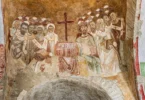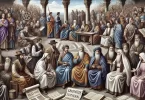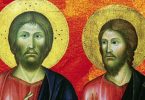This year we celebrate 500 years of the Protestant Reformation. On October 31, 1517, the then Augustinian monk, priest, and teacher Martin Luther nailed at the door of a church in Wittenberg, Germany, a document with 95 theses on salvation, that is, basically the way people are led by the Christian God to Heaven. Luther was scandalized by the sale of indulgences by the Roman Catholic Church, believing that this practice did not correspond to the biblical teaching. Luther understood that salvation was given only by faith. The Catholic Church understood that salvation was a combination of faith and works.
The practice of nailing a document at the door of the church was not uncommon, and Luther’s intention was to hold an academic debate on the subject. However, Luther’s ideas found many sympathizers and a wide-spread protestant movement within the Roman Catholic Church was quickly initiated. Over the years, other leaders such as Ulrich Zwingli and John Calvin joined Luther. However, the main leaders of the Roman Catholic Church did not agree with the Reformers’ point of view, and so the Christian church in the West was divided into several groups: Lutherans, Anglicans, Reformed, Anabaptists, later followed by Methodists, Pentecostals and many others. In short, the Christian church in the West has never been the same.
The Protestant Reformation was obviously a movement of great importance in world religious history. I also believe that few would disagree with its importance in the broader context of history, especially Western history. To mention just one example, Max Weber’s thesis that Protestantism (especially Calvinism, and more precisely Puritanism) was a key factor in the development of what he called modern capitalism is very accepted, or at least enthusiastically debated. But I would like to briefly address here another impact of the Protestant Reformation on world history: the development of freedom of conscience.
Simply put, but I believe that not oversimplifying, after the fall of the Roman Empire and until the 16th century, Europe knew only one religion – Christianity – in only one variety – Roman Catholic Christianity. It is true that much of the paganism of the barbarians survived through the centuries, that Muslims occupied parts of Europe (mainly the Iberian Peninsula) and that other varieties of Christianity were practiced in parts of Europe (mainly Russia and Greece). But besides that, the history of Christianity was a tale of an ever-increasing concentration of political and ecclesiastical power in Rome, as well as an ever-widening intersection of priests, bishops, kings, and nobles. In short, Rome became increasingly central and the distinction between church and state increasingly difficult to observe in practice. One of the legacies of the Protestant Reformation was precisely the debate about the relationship between church and state. With a multiplicity of churches and strengthening nationalisms, the model of a unified Christianity was never possible again.
Of course, this loss of unity in Christendom can cause melancholy and nostalgia among some, especially Roman Catholics. But one of its gains was the growth of the individual’s space in the world. This was not a sudden process, but slowly but surely it became clear that religious convictions could no longer be imposed on individuals. Especially in England, where the Anglican Church stood midway between Rome and Wittenberg (or Rome and Geneva), many groups emerged on the margins of the state church: Presbyterians, Baptists, Congregationalists, Quakers, and so on. These groups accepted the challenge of being treated as second-class citizens, but maintaining their personal convictions. Something similar can be said about Roman Catholics in England, who began to live on the fringes of society. The new relationship between church and state in England was a point of discussion for many of the most important political philosophers of modernity: Thomas Hobbes, John Locke, Edmund Burke, and others. To disregard this aspect is to lose sight of one of the most important points of the debate in which these thinkers were involved.
The Westminster Confession of Faith, one of the most important documents produced in the period of the Protestant Reformation, has a chapter entitled “Of Christian Liberty, and Liberty of Conscience.” Of course there are issues in this chapter that may sound very strange to those who are not Christians or who are not involved in Christian churches. However, one point is immediately understandable to all: being a Christian is a matter of intimate forum. No one can be compelled to be a Christian. At best this obligation would produce only external adhesion. Intimate adherence could never be satisfactorily verified.
Sometime after the classical Reformation period, a new renewal religious movement occurred in England with the birth of Methodism. But its leading leaders, John Wesley and George Whitefield, disagreed about salvation in a way not so different from what had previously occurred between Luther and the Roman Catholic Church. However, this time there was no excommunication, inquisition or wars. Wesley simply told Whitefield, “Let’s agree to disagree.”
Agreeing to disagree is one of the great legacies of the Protestant Reformation. May we always try to convince each other by force of argument, not by force of arms. And that each one has the right to decide for themselves, with freedom of conscience, which seems the best way forward.
Source: https://notesonliberty.com/2017/04/27/the-protestant-reformation-and-freedom-of-conscience/
The Protestant Reformation and freedom of conscience Part Two
Some months ago I posted a text on the connection of the Protestant Reformation and freedom of conscience. About it, fellow Notewriter Mark Koyama tweeted:
“Disagree or at least the effect of the Reformation on freedom of conscience was indirect. Just read Luther or Calvin on religious freedom!”
I’m not sure what he means. What should I read that Luther or Calvin wrote? Please, be more specific. I read a lot of Calvin and a little of Luther, but I maintain my point: there is a strong connection between the Protestant Reformation and freedom of conscience. I may, however, agree that this connection is indirect.
When Max Weber connected the protestant ethics to the “spirit” of capitalism, he was very careful to say the following: John Calvin and Martin Luther couldn’t care less about economics. The salvation of the soul, and only that, was their concern. Nevertheless, the ideas they preached set in motion a process that resulted in the development of modern capitalism. My observation about the connection between the Protestant Reformation and Freedom of Conscience is similar to that: maybe we will not be able to find in Luther or Calvin an advocacy of what we understand today as freedom of conscience. But it is my firm understanding that we will find in them the seeds for it. Actually, it’s more than that: we would find the seeds for it in Jesus Christ himself. When Jesus said “give to Caesar what is Caesar’s and to God what is God’s” he already established the separation of church and state. The Apostle Peter did the same when he said that “it is more important to obey God than men”, and so did the Apostle Paul when he established limits to the power of secular authorities in his epistle to the Romans. We could go even further and find seed to it in the prophet Samuel, when he warned the people of Israel of the potential tyranny of kings. All this was somehow lost when, from Constantine to Theodosius I, Christianity became the official religion of the Roman Empire, and also when Charlemagne was crowned emperor by Pope Leo III. The wall between church and state was severally breached.
So, again, I never actually said that John Calvin or Martin Luther were, to our modern standards, champions of religious freedom. That’s a statement I never made. Both were opposites of the Anabaptist and wrote extensively against them. Granted, some Anabaptists were very much the 16th century version of ISIS (important! I’m in no way putting an equal sign between these two groups! Please, don’t misread what I write), and I’m actually really happy those two opposed them. But other Anabaptists were peaceful (such as the Mennonites) and suffered along. We can also mention the bitter opposition Luther had to Jews at one point in his life. But regardless. What I said is that the religious freedom we enjoy in our world today is to a great degree a product of the Protestant Reformation. As much else in history, this is not a clear cut transformation, but a gradual one.
What I proposed was technically a counterfactual: no Protestant Reformation, no freedom of conscience as we know today. Of course, history has one big problem with counterfactuals: we can never rewind the tape of history and then play it again changing just one detail. But I believe that, as much as we can compare History to a more empirical discipline, we can say that without the Protestant Reformation we would not know freedom of conscience as we know today. As I mentioned in my first post, this was not a clear cut passage in history. When we talk about causality in history, very few things are. What I meant is that the Protestant Reformation was to a major degree the breaking point that lead to our modern understanding of freedom of conscience.
But what was the Protestant Reformation, anyway? The Protestant Reformation was mainly a religious movement in Western Europe that lead to the break of the unity of Western Christianity. It was not a perfectly cohesive movement. When we talk about “Protestants”, the group that best fits this description are some Lutheran princes that “protested” against the anti-Lutheran policies in the Holy Roman Empire in the 1520s. But very soon the name protestant began to be used to describe any non-catholic group that appeared in Western Europe in the 16th century. From that we have four main protestant groups: Lutherans (called simply evangelicals in Germany and other areas in Europe), Reformed (or Calvinists, after the major influence of John Calvin over this sect), Anabaptists and Anglicans (who sometime don’t even like to be called protestants).
Martin Luther and John Calvin may have been the great stars of the reformation, but they were most certainly not alone. Just to mention a few, we can remember Huldrych Zwingli, Martin Bucer William Farel, Thomas Cranmer and John Knox as great leaders of the reformation. These men were united in their opposition to the Pope in Rome, but had many disagreements among them. Certainly they knew what united them and where they disagreed. But they were not wish-wash about what they believed. But still we can notice the desire to tolerate differences and unite on essentials. Philip Melanchthon, a great friend to Martin Luther and also a great early Lutheran theologian would be an excellent example of this attitude. Zacharius Ursinus, the main author of the Heidelberg Catechism would fit just well.
Extremely early on in the history of the Reformation we have Martin Luther on the Diet of Worms stating that “Unless I am convinced by the testimony of the Scriptures or by clear reason (for I do not trust either in the pope or in councils alone, since it is well known that they have often erred and contradicted themselves), I am bound by the Scriptures I have quoted and my conscience is captive to the Word of God. I cannot and I will not recant anything, since it is neither safe nor right to go against conscience. May God help me. Amen.” Yeah, some people may contest that he never uttered these words, and that the whole episode is but a myth. Regardless, it came to encompass the spirit of the Reformation as few other moments.
Some may say that I have a very stretchy definition of the Reformation, but in general, when I think about it, I define it chronologically as a period that goes from Luther to the Westminster Standards, so, about a century and a half of religious transformations in Europe. In that way, Luther was just the start of this religious movement. Calvin was already a second generation reformer. Many theologians would follow in the next century or so. Each one would build on the knowledge of the previous generation, coming, among other things, closer to our modern understanding of religious freedom and freedom of conscience. That’s why we may be unable to find much about religious freedom in Luther or Calvin (as Mark seems to claim in his tweet), but we already find a whole chapter on it in the Westminster Confession of Faith.
Between Luther and the Westminster Assembly we had many notable events. For instance, the Augsburg Peace of 1555, that already granted some level of religious freedom to Catholics and Lutherans in Germany. It was not a perfect agreement, so much so that it couldn’t avoid the Thirty Years War (1618-1648), ended by the Peace of Westphalia. This peace agreement took religious liberty to a new level. Very importantly, as Daniel Philpott already observed: no Protestant Reformation, no Thirty Years War, no Peace of Westphalia, no International Relations as we know today. I could add no secular states and no religious freedom and freedom of conscience as we know today. We also had the English Reformation, with the Puritan Reformation in between. From England to the other side of the Atlantic the story was even more interesting, with puritans and nonconformist seeking for a place where they could exercise their religion freely.
I’d like to remember also that one of the mottos of the Reformation was “Ecclesia semper reformanda est,” the church must always be reformed. There is a classical period of the Reformation, stretching from the 16th to the 17th century, or from Luther’s 95 Theses to the Westminster Standards. But the Reformed (or more broadly, protestant) churches didn’t stop there. We still have important developments in protestant theology in the following centuries, and even today. Maybe John Calvin and Martin Luther are not the best way to look for a broader version of freedom of conscience. But the religious movement they helped to start, building on their foundations, helped more than anything I can think of to establish what we know today as freedom of conscience. In my last post I mentioned John Wesley. But I could just as well mention William Penn, Roger Williams and many others. William Penn, a Quaker, founded Pennsylvania, to where many people (Catholics included) fled in search of freedom of conscience. Roger Williams, a Baptist, was the original source for the concept of “wall of separation” between church and state, that years later, in 1802, Thomas Jefferson would quote in a letter to the Danbury Baptist Association.
Anyway: as I mentioned several times already, very few changes in history are clear cut. It is also pretty trick to identify causality in history. But I believe that, as far as we can go with that, the Protestant Reformation was a major changing point to what we have today as freedom of conscience, a freedom as basic as one can get in a classic liberal society.
Comments:
Mark Koyama
There is no disagreement that the Reformation was a huge shock to the religious economy of Europe. In this sense it is a crucial part of the story of the rise of religious freedom. So your counterfactual is not wrong. But the effects were indirect, contingent, and not realized for several centuries and so your account reminded me too strong of the pro-Protestant accounts one finds in 19th and early to mid-20th century Anglo-American historians. It strikes me as a Whig history.
For now I would simply note the following:
- None of the major figures in the Reformation were in favor of freedom of religion. Yes Luther was briefly in favor of faith by conscience along in the late 1510s and early 1520s but changed his mind by around 1524-1525 and by the 1530s he was in favor of compelling faith through force. Calvin was opposed to non-Trinitarians and burned Michael Servetus. In the Reformation period, freedom of conscience was something advocated by marginalized radicals opposed by everyone else or by those who were directly threatened with persecution.
- Had the Reformation “succeeded” there would have been no freedom of thought in Protestant states (there was none in Geneva). It was the failure of the Reformation to persuade or defeat Catholicism and the tendency of Protestant sects to have schisms and split off from one another that led to both religious conflict and the first temporary agreements to tolerate different denominations i.e.g the Edict of Nantes, Peace of Augsburg. We may celebrate these achievements today but at the time both Catholics and Protestants saw them as temporary expedients to be overturned once the balance of power changed.
- When religious freedom emerged in the 17th to 19th centuries it was often due to pragmatic reasons of state as much as anything else and individuals such as Michael L’Hopital, Cardinal Richelieu, Colbert, William of Orange, Joseph II (none of them especially devout individuals!) all played an important role .
Bruno Gonçalves Rosi
- Of course Calvin was opposed to non-Trinitarians. All Christians are opposed to non-Trinitarians. But he didn’t burn anyone. Ok, I should have seen this coming. Servetus was burned by the authorities in Geneva. Calvin had no power to burn anyone there. Yes, he was asked in the matter as a theologian, and so, as a religious authority. And yes, we can’t find anything written by Calvin showing regret for this episode. But that’s different from saying he burned people.
- There was a great freedom of religion in Geneva for its time: you can always leave if you want. Of course. That’s still very far from freedom of conscience. But it’s a move in the right direction. Besides that, until very latter in life Calvin experienced bitter political opposition, so, what happened in Geneva was usually far from Calvin’s blueprint. Also, your statement that “Protestants saw them as temporary expedients to be overturned once the balance of power changed” has no empirical evidence whatsoever. Not if we take it as general as it is. It is more than clear that individuals as Philip Melanchthon, Zacharius Ursinusand and Calvin himself were willing to tolerate differences with other protestants. It is clear from the Augsburg Confession that Lutherans were trying to show what they had in common with Catholics, much more than their differences.
- There is a lot to say about reason d’état when it comes to religious freedom. But it’s also important to notice (as Daniel Philpott already did) that Catholics such as Richelieu were being protestant in their political thinking: they were emphasizing the separation of church and state, something that, as I already noticed, goes back to Jesus himself (or even to Moses), but with an important contribution by Saint Augustine in City of God, but that was somewhat lost in the late middle ages. Both Luther and Calvin were again emphasizing this. No wonder basically all reformed confessions have chapters on this subject. But it’s true: as Alister McGrath already noticed, the relationship between the magisterial reformers, the Anabaptists and political authorities was an uneasy one. Anyway: I don’t see why we should look solely (or mainly) to secular authorities thinking on matters of raison d’état to find the roots of modern religious freedom. Why the theological developments I already mentioned (puritans and nonconformists, and especially reformed Baptists as Roger Williams, besides the Quakers) are not as important as or more?
- What’s wrong in being pro-Protestant? What is wrong in Whig history? That’s a description, not an argument.
tradcat4christ
A good read is The Protestant Reformation by Hillair Belloc or The Crisis of Civilization by the same. Protestantism claims to base its entire belief system in the Bible alone, but the principle of “The Bible alone” is a non-Biblical principle; it is a principle that is nowhere found in the Bible. God bless.
Simon
You will see how “the puritans” inadvertently won us our freedom if you read a book I am currently now enjoying “Liberty and Reformation in the Puritan revolution” by William Haller.







